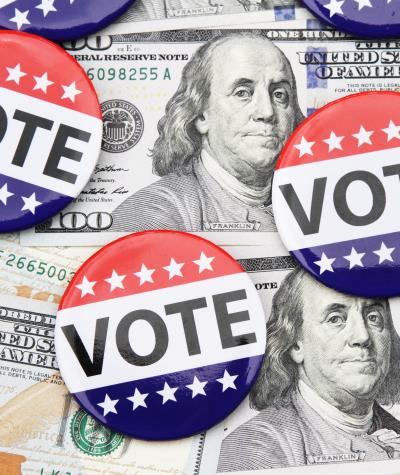Super PACs and dark money groups raise and spend substantial amounts of money — often out pacing candidates’ campaign committees — intended to influence the outcome of U.S. elections. But these groups are all subject to different kinds of rules about fundraising and spending, and raise different problems as voters attempt to follow the money.
What are the Differences Between a PAC, a Super PAC and a Dark-Money Group?
Political Action Committee (PAC): a political committee that raises or spends more than $1,000 to influence the outcome of a federal election in a calendar year and is thus required to register with the Federal Election Commission (FEC). A PAC may accept a contribution of up to $5,000 per year from any individual. It may not accept union or corporate treasury funds. A multicandidate PAC may contribute up to $5,000 per election to a candidate and $15,000 to a party committee. It has no limit on the aggregate amount it may contribute. PACs established by corporations and labor unions, referred to as separate segregated funds (SSF), operate under slightly different rules, e.g., a corporation or union may cover its SSF’s administrative expenses.
Super PAC: a political committee that meets the same threshold as any PAC of spending more than $1,000 to influence the outcome of a federal election and is thus required to register with the FEC. “Super PAC” is the shorthand for what the FEC refers to as independent expenditure-only political committee. What differentiates a Super PAC is that it may accept unlimited contributions from any non-foreign source, including union and corporate treasury funds. It may spend unlimited amounts to influence the outcome of federal elections through independent expenditures. However, it may not contribute directly to a candidate, and it may not coordinate with a candidate in making its expenditures. The contributions and expenditures of a Super PAC are publicly disclosed on the FEC’s website.
“Dark Money Group”: a 501(c)(4) social welfare group or (c)(6) trade association named after the sections of the Internal Revenue Code that grant tax exempt status to these organizations. Sometimes referred to as “issue advocacy” groups, they can accept unlimited contributions from any source and are not required to publicly disclose their donors. 501(c)(4) and (c)(6) organizations may engage in some candidate election related activities; however, such activities may not be the primary activities of the organizations. It is generally understood that a group’s primary activities will not be considered engaged in political campaigns if it spends less than 50 percent of its funds on electioneering. These groups may not contribute directly to a candidate but they may contribute unlimited amounts to a Super PAC supporting a candidate.
Other Resources:
Sunlight Foundation's Presidential Fundraising Tracker
Open Secrets' Information about Super PACs $
Open Secrets' Information on Political Nonprofits ("Dark Money")
